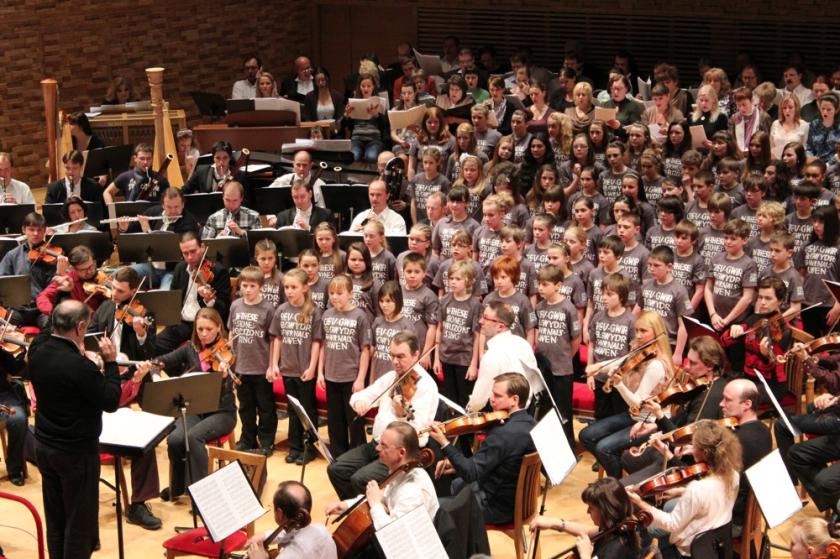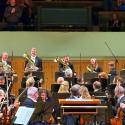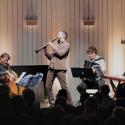Gergiev’s second Cardiff concert was thematically linked to his first. Mahler’s Eighth Symphony shares with Parsifal a certain kind of solipsistic religiosity that talks about God in the way some people talk about their ancestors. We don’t really need them any more, but they make us feel important. One approaches both works with mixed feelings (some, with actual distaste). But in the end one usually has to admit: art conquers, and God is not (altogether) mocked.
Mahler, it can’t be denied, isn’t quite Wagner. The spiritual and intellectual complexity of Parsifal bypasses the fake religion (or, rather, replaces it), and the music itself is utterly devoid of vulgarity. Mahler’s Eighth is occasionally vulgar and self-important. Nobody who can say of a work of theirs “it’s the greatest thing I’ve yet done” is safe from the banal. It does bang an awful lot of drums and grab the attention in the most childish, noisy, self-advertising way; you’ve only to compare its setting of the “Veni, creator spiritus” with the plainsong tune sung in unison by a choir of monks to get the difference between sanctity and theatricality.
Yet there are so many beautiful things, so much exquisite detail, so much mastery of means in this nonstop eighty-minute sweep from the Latin Gradualia to the final part of Goethe’s Faust that one readily forgives its excesses. And under Gergiev’s curiously indecipherable (from the audience) hand, with its shakings and wavings, its seeming unrelatedness to the beat yet obviously effective control, everything came together, and the performance – a few mild ensemble problems apart – entirely deserved the wild enthusiasm that greeted its deafening E flat major close.
I praised the Russian singers and the Mariinsky orchestra in Parsifal. I’ll do so again only to single out Viktoria Yastrebova and Sergey Semishkur as the most obviously outstanding in an impressive bunch of soloists. As for the orchestra, informed opinion has it that Mahler’s score needs a minimum of 120 players; Gergiev had about ninety, and most of the deficiency was in the strings. The modest numbers worked in Parsifal. Here they sometimes fell short, failing to bind the texture or balance out the huge wind section that Mahler uses, and uses to the full. Yet in sheer quality their playing couldn’t be faulted. The soft string lines here and there in the Faust setting were memorably refined, not least as pools of tranquillity amid the endless straining and striving. Mostly, though, the balance too obviously favoured the wind, to brilliant but occasionally strident effect.
The real story of this Mahler, however, was about the choruses. The Eighth is a genuinely choral symphony in the sense that the choirs (double choir plus children’s choir) truly participate in the symphonic working, just as much as the instruments do. The long second movement has been called a cantata and an oratorio, and both are wrong. Even the spacing of the choirs is part of the organic design, and that was particularly the case here because Gergiev had the children’s choir (nearly a hundred of them) in between the woodwind and brass sections of the orchestra, with the Mariinsky and BBC NOW choruses – superb as ever – well back in the perspective but in no way upstaged.
It was a bold idea to put the children so near the front; it crowded the stage and made an issue of their platform manner and manners. But of course a lot of the audience had come to hear their children perform; and they weren’t disappointed. The Only Kids Aloud Chorus (its name is the only tiresome thing about it) is clearly a marvellous outfit, brilliantly trained and turned out by their chorus master Tim Rhys-Evans.
They sang their music immaculately, from memory, and with warm, vibrant tone. In between they sat like the “seliger Knaben” – the blessed boys (no ambiguity in the German) – Mahler calls them. And what a thrilling time this must have been for them. A week ago they were all in St Petersburg, singing this same work in the new Mariinsky concert hall. Some of the girls and boys had never even got as far as Cardiff before. And not the least exciting aspect of this choir, as of others recently formed (like the Opera North Children’s Choir), is the level of support it gets from parents. Politicians, please note. Music can change lives, at least as much as football or IT.
I wonder, though, what these same parents, and their fellow audience-members, made of this very wordy Mahler symphony, with no programme text, no surtitles, and only a rough synopsis to help them decipher the obscurities of Goethe’s verse, with its strange dramatis personae: its Magna Peccatrix, Mulier Samaritana, Pater Ecstaticus and the rest. And as for the Eternal Feminine leading us on (Goethe’s famous last line), let’s not forget, before we wax too philosophical, that she starts – in Parsifal as well as Genesis – by leading us up the garden path.














Add comment